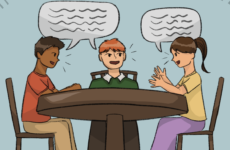“Are you really going to eat that pizza?” Midway through my second slice, my gaze set on a third, I looked up to catch my friends engage in an all-too-familiar conversation.
“Yeah?” said my second friend.
“Are you even dedicated to our diet? If you eat that, you can’t come to the gym with me anymore,” said the first friend.
I sat back, shocked. This conversation was undoubtedly toxic, but it’s not like this happens often, right? Wrong. After this conversation in October, I began to pay more attention to the diet culture on campus; the more I looked, the more frightened I became.
On the surface, it seems like Choate students are simply passionate about physical health — the salad bar is popular, and the gym is often packed. Yet, many students’ fitness goals have toxic motivations. In line with conventional beauty standards, many female students want to slim down, while many male students want to bulk up.
First and foremost, body shape and size do not necessarily correlate to health. A woman may be technically “overweight” and still have a lower heart rate, blood pressure, and cholesterol level than someone half her size. Similarly, the standard of what is considered “healthy” is different for everyone.
Still, many students aren’t actually seeking a healthier version of themselves when they go on a diet or workout. Instead, they are in pursuit of a prettier, and therefore happier, version. But even thirty pounds lighter, insecurity is still a challenge and will manifest itself in some other physical trait, creating a dangerous cycle of external renovation as a cure for an internal battle.
This issue is exacerbated by the unique circumstances we experience as boarding school students. Not only are we bombarded with pressure from the media to “Go For That Beach Bod In 50 Days Or Get Your Money Back!” but we also eat every meal together and share the same gym. In such a close environment, comparison is inevitable — and that breeds insecurity.
For me, the emphasis on dieting at Choate, especially among female students, has sent me back a few steps in my own body image and fitness. I’ve been on a body image journey since fifth grade, whenI stopped looking in the mirror. I went through puberty earlier than many of my classmates: I had severe acne, was the tallest one in my class, and wore extra large mens’ T-shirts to mask my changing body. It was mid-way through the year that I realized if I didn’t look in the mirror, none of these realities would exist. I brushed my teeth in the dark. I had a sixth sense for reflective surfaces and a knack for casually avoiding them. The ghosts of these insecurities still haunt me today. But after five years of struggling, I’m slowly learning to love myself and my miraculous body.
However, Choate’s fitness culture has proven a difficult obstacle to overcome in this process. It is hard to remind ourselves to take care of our bodies because we love them, not because we hate them, especially when students only allow themselves to have a “cheat day” if they’ve done a certain number of curl-ups. It is hard to forgive ourselves for eating what our body tells us to when full figure pictures get more Instagram likes. It is hard not to cry over the number on our jeans when we are constantly comparing ourselves to someone who wears a smaller size. It is hard to like what I see in the mirror when I had three slices and my friend was ridiculed over one.
We all have insecurities, but comparing habits to others or projecting insecurities onto others should never be the answer to these struggles. It is such a miracle that we have beautiful bodies that allow us to make the dreaded trek from Lanphier to Steele, to create music, to be. Let’s eat healthy and exercise to celebrate this miracle, not to squash it.



